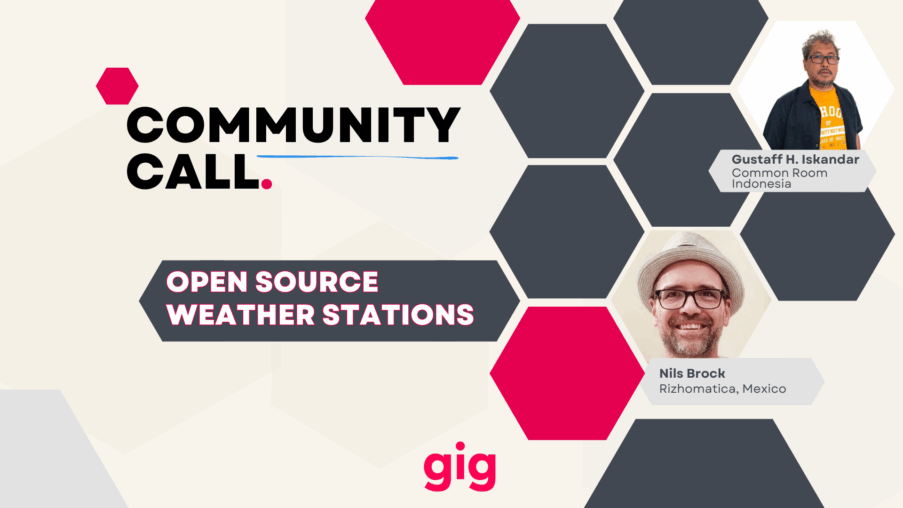The Global Innovation Gathering (GIG) recently hosted a community call focused on open-source weather stations and their role in fostering climate resilience. The session featured presentations from Gustav Iskander of Common Room Indonesia and Nils Brock from Rhizomatica, who shared their experiences in developing community-centred technologies. The discussion highlighted the intersection of open-source hardware, local services, and environmental monitoring, offering valuable insights for grassroots initiatives worldwide.
Nils Brock introduced the Local Networks (LocNet) Initiative, a collaborative effort between the Association for Progressive Communications (APC) and Rhizomatica. The initiative aims to support rural and marginalised communities in achieving meaningful connectivity. LocNet emphasises locally relevant services, such as environmental monitoring, agriculture, and disaster response, which align with community needs. The project operates in seven countries, including Indonesia, where Common Room has been a key partner.
Gustav Iskander detailed Common Room’s work on open-source weather stations as part of their Community-Based Innovation Lab for Climate Resilience. The project, which commenced in 2024, aims to collect microclimate data to support informed decision-making in farming, fisheries, and disaster preparedness. Pilot sites in Maros (South Sulawesi) and Aceh (Western Indonesia) demonstrate the potential of these tools. The stations monitor parameters like salinity, acidity, and water levels, providing actionable insights for local communities.
A significant challenge highlighted by Royce, a project collaborator, is the lack of technical skills and digital literacy in rural areas. The team employs participatory rural appraisal methods to assess community needs and tailor training programs accordingly. This approach ensures that technology adoption is gradual and context-specific, respecting indigenous knowledge and local sovereignty. For instance, in some regions, it took years to introduce internet access, while others embraced it more quickly.
The call also addressed regulatory hurdles, particularly in Indonesia, where weather data policies restrict the public dissemination of information. Royce noted that sharing environmental data can result in fines or legal consequences, complicating efforts to democratise climate information. This politicisation of weather data underscores the need for advocacy to align policies with global sustainability goals, such as the SDGs.
Participants discussed the technical aspects of sensor compatibility and data transmission. Mustafa from Ghana raised questions about integrating mercury detection sensors for monitoring water pollution. Gustav explained that while their current devices focus on salinity and acidity, but the open-source framework allows for adaptation. Nils Brock mentioned the ESP32 sensor board as a versatile tool for integrating diverse sensors, including those for detecting chemical pollutants.
Kim from SenseBox shared their work on educational kits using ESP32 modules, which are deployed in schools to teach computational thinking. These kits, part of the openSenseMap platform, transmit environmental data via LoRa, Wi-Fi, or low-frequency technologies. Kim offered to connect the Common Room with technical experts to explore collaborative solutions for data transmission in off-grid areas.
Power management emerged as another critical issue. Solar panels and MPPT (Maximum Power Point Tracking) devices are commonly used in remote locations, but their efficiency can vary significantly depending on environmental conditions. Gustav noted that initial attempts with German-designed hardware faced challenges in tropical climates, highlighting the need for localised adaptations.
The discussion concluded with reflections on scaling and collaboration. Geraldine from GIG emphasised the potential for grassroots networks to replicate these projects globally, adapting them to diverse contexts. Nils Brock suggested documenting sensor designs and repair processes to empower communities in maintaining their systems.
Looking ahead, Gustav envisioned a future where open-source technologies amplify community agency in climate adaptation. He emphasised the importance of global knowledge-sharing networks, such as GIG, in overcoming technical and regulatory barriers. The call underscored the transformative potential of community-led data collection in addressing climate challenges.
For further exploration, consider examining the DIY weather station code, SenseBox’s educational kits, and the openSenseMap platform. These tools exemplify the collaborative spirit driving innovation in environmental monitoring.
The session reinforced the value of open-source approaches in democratising technology and fostering resilience. By bridging local knowledge with global expertise, initiatives like Common Room’s weather stations exemplify how communities can lead the way in climate adaptation. GIG’s role in facilitating these exchanges highlights the power of networked innovation in addressing pressing global challenges.


